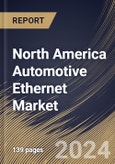In recent years, there has been a significant transformation in the automotive Ethernet market, propelled by the increasing intricacy and need for connectivity in the automotive sector. As vehicles evolve into sophisticated digital platforms, the need for advanced communication systems has become paramount. It is, a technology originally developed for the IT industry, has emerged as a robust solution to meet the stringent requirements of the modern automotive ecosystem.
In addition, the widespread implementation of the Ethernet has been facilitated by its capacity to accommodate the increasing demands for data transmission within vehicles. Traditional automotive networks, such as the Controller Area Network (CAN) and Local Interconnect Network (LIN), are facing challenges in effectively handling the substantial quantities of data generated by connected vehicle components like infotainment systems, advanced driver assistance systems, and infotainment systems. This Ethernet, with its high data transfer rates and scalability, has become a preferred choice for automakers seeking to create intelligent and interconnected vehicles.
Canada is witnessing a rising wave of adoption of electric vehicles (EVs) and autonomous driving technologies. The automotive industry's shift towards cleaner and smarter mobility solutions necessitates advanced communication networks. Automotive Ethernet, with its high bandwidth and low latency, plays a pivotal role in supporting the intricate communication requirements of EVs and autonomous vehicles, contributing to their growth in the Canadian automotive sector. According to the data by Statistics Canada, 147,401 motor vehicles were sold in Canada in July 2021. Hence, the rising automotive sector in North America will assist in the growth of the market.
The US market dominated the North America Automotive Ethernet Market by Country in 2022, and would continue to be a dominant market till 2030; thereby, achieving a market value of $1,249.3 million by 2030. The Canada market is experiencing a CAGR of 16.2% during (2023 - 2030). Additionally, The Mexico market would exhibit a CAGR of 15.7% during (2023 - 2030).
Based on Vehicle Type, the market is segmented into Passenger Cars, and Commercial Vehicles. Based on Component, the market is segmented into Hardware, Software, and Services. Based on Application, the market is segmented into Driver Assistance, Infotainment, Powertrain, Chassis, Body and Comfort, and Others. Based on countries, the market is segmented into U.S., Mexico, Canada, and Rest of North America.
List of Key Companies Profiled
- Broadcom, Inc.
- NXP Semiconductors N.V.
- Marvell Technology Group Ltd.
- Microchip Technology Incorporated
- Vector Informatik GmbH
- Molex, LLC (Koch Industries, Inc.)
- Texas Instruments, Inc.
- Cadence Design Systems, Inc.
- Keysight Technologies, Inc.
- Aukua Systems Inc.
Market Report Segmentation
By Vehicle Type- Passenger Cars
- Commercial Vehicles
- Hardware
- Software
- Services
- Driver Assistance
- Infotainment
- Powertrain
- Chassis
- Body and Comfort
- Others
- US
- Canada
- Mexico
- Rest of North America
Table of Contents
Companies Mentioned
- Broadcom, Inc.
- NXP Semiconductors N.V.
- Marvell Technology Group Ltd.
- Microchip Technology Incorporated
- Vector Informatik GmbH
- Molex, LLC (Koch Industries, Inc.)
- Texas Instruments, Inc.
- Cadence Design Systems, Inc.
- Keysight Technologies, Inc.
- Aukua Systems Inc.








